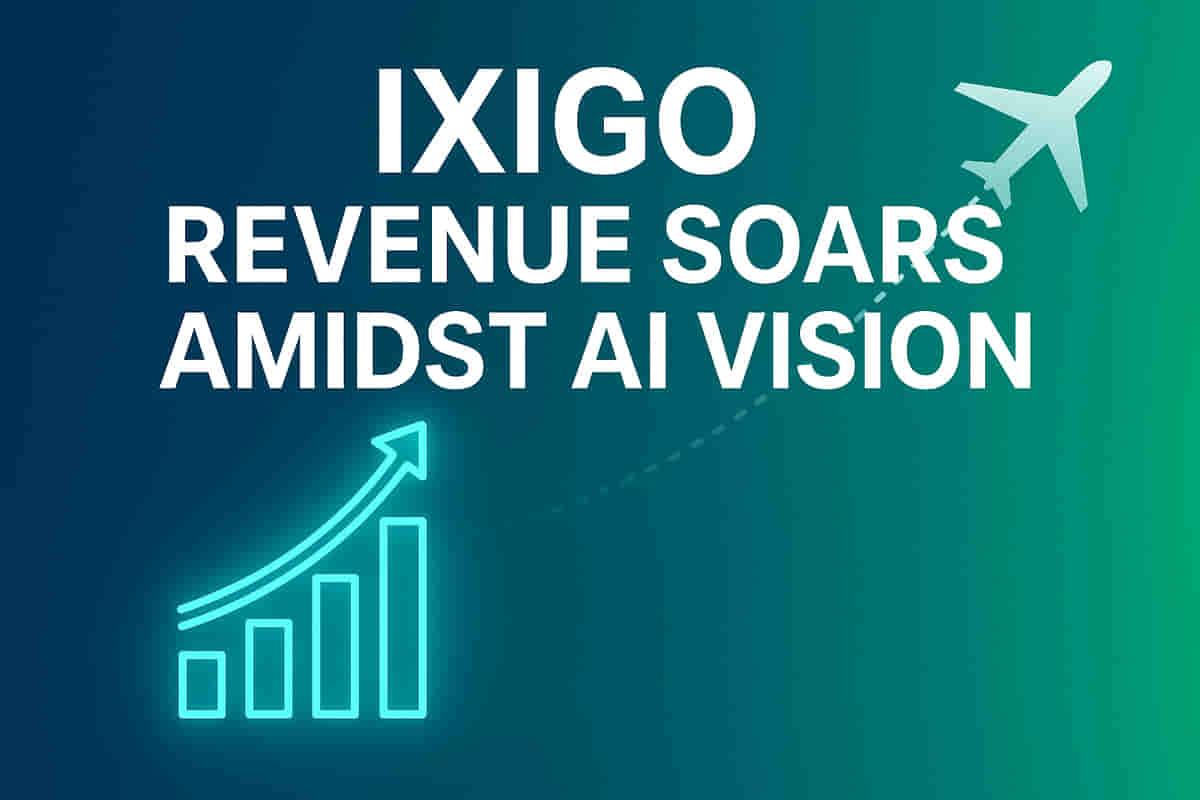Ixigo Reports Strong Revenue Growth in Q2 FY26 Despite Net Loss Fueled by ESOP Expense, Eyes AI-Led Future
Tech
|
30th October 2025, 10:25 AM

▶
Stocks Mentioned :
Short Description :
Detailed Coverage :
Ixigo's revenue from operations surged by 37% year-on-year to ₹2,827.41 crore in the second quarter of FY26. Gross Transaction Value (GTV) also saw robust growth, increasing by 23% to ₹43,474.97 crore. This was driven by strong performances across flight bookings (GTV up 29%), bus bookings (up 51%), and train bookings (up 12%). Contribution margin climbed 20% year-on-year to ₹1,095.84 crore, while adjusted EBITDA rose significantly by 36% to ₹284.76 crore.
The company reported a net loss of ₹3.46 crore for the September quarter of FY26, a shift from a profit of ₹13.08 crore in the same period last year. This loss was largely due to a one-time, non-cash employee stock option (ESOP) expense of ₹26.9 crore. Excluding this charge, the Profit Before Tax (PBT) would have shown a 26% increase to ₹24.4 crore.
Group CFO Saurabh Devendra Singh stated that despite challenges, the company achieved profitable growth and emphasized the ESOP charge's non-cash nature, aligning with shareholder interests. Co-founder and group CEO Aloke Bajpai described the quarter as one of steady growth and resilience, highlighting opportunities found despite market headwinds.
Ixigo is planning a significant strategic push into AI-led products and the hotel segment. To support this, the company is raising ₹1,296 crore through a preferential issue from global technology investor Prosus (MIH Investments One B.V.). This capital will enable investments in AI-driven digital assets and platforms for future growth. Co-founder Rajnish Kumar envisioned travel apps evolving into conversational, hyper-personalized intelligent assistants.
Flight and bus businesses outperformed the market. While train growth moderated due to regulatory changes, Ixigo maintained its market share. Operating cash flow for the first half of FY26 was ₹915.46 crore, indicating strong capital efficiency. The management's focus is on sustainable growth, prioritizing AI platforms and deeper hotel integrations over aggressive discounting.
Impact This news is highly relevant for investors in the Indian stock market. Ixigo's strong operational performance signals underlying business health and growth potential in the online travel sector. The planned expansion into AI and hotels, backed by significant funding, could drive future value. However, the reported loss, even if due to a one-off expense, may cause short-term investor caution. The overall sentiment for technology and consumer internet stocks in India could be influenced. The stock of Ixigo (Le Travenues Technology Limited) is expected to see significant interest. Impact Rating: 7/10
Difficult Terms Revenue from Operations: The total income generated from the company's core business activities before deducting any expenses. Employee Stock Option (ESOP): A grant given to employees that gives them the right to buy company shares at a predetermined price. It's a form of employee compensation and retention. Profitability: The ability of a company to earn a profit; its state of being profitable. Gross Transaction Value (GTV): The total monetary value of all transactions processed through a platform over a given period, before deducting fees or commissions. Contribution Margin: The revenue remaining after deducting the variable costs associated with making and selling a product. It's the amount that contributes to covering fixed costs and generating profit. Adjusted EBITDA: Earnings Before Interest, Taxes, Depreciation, and Amortization, adjusted for certain non-recurring or non-cash items to provide a clearer picture of operational performance. Profit Before Tax (PBT): The profit a company has earned before the deduction of income tax. Share of Loss of Associates: A company's proportionate share of the losses incurred by its associated companies (companies in which it has significant influence but not control). Exceptional Items: Unusual or infrequent gains or losses that are material in nature, shown separately to help investors understand the company's ongoing performance. Non-cash Expense: An expense that does not involve an outflow of cash. Examples include depreciation or amortization. Corporate Governance: The system of rules, practices, and processes by which a company is directed and controlled. Preferential Issue: A method of raising capital where a company issues shares to a select group of investors (preferential allottees) at a determined price, rather than offering them to the general public. AI-led Products: Products or services that are developed and powered by Artificial Intelligence technologies. Conversational AI: A type of artificial intelligence that enables computer-human interaction through natural language. Multimodal AI: Artificial intelligence that can process and understand information from multiple types of data (e.g., text, images, audio, video). Hyper-personalized Agents: Digital assistants or services that are tailored to an individual user's specific preferences, behaviors, and context to an extreme degree. Intelligent Assistants: Software agents that can perform tasks or provide services based on commands or questions, often using AI. Operating Cash Flow: The cash generated from a company's normal business operations over a period of time. Capital Efficiency: The ability of a company to generate revenue or profit from its capital investments. Sustainable Growth: Business growth that can be maintained over the long term without depleting resources or causing negative environmental or social impacts.